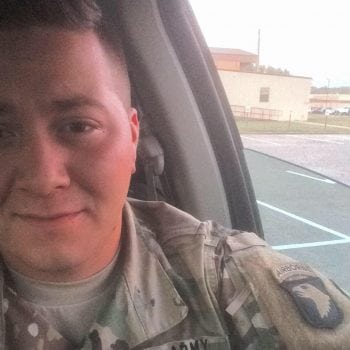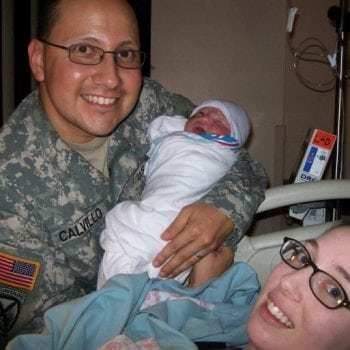North Carolina VA Home Loans:
Eligibility, Getting Started and FAQs
Our team of VA home loan specialists helps veterans, active military members, & their families realize the American dream of homeownership.
Thanks to the VA Home Loan Program, those who qualify can purchase a home with no down payment, low interest rates and low credit score options. Our experts are trained on eligibility, requirements and North Carolina’s state specific benefits to make the mortgage process simple and stress-free.
Even if you’ve been told otherwise, a 620 credit score is not required for a VA loan. We can approve loans with a 620 credit score and we have a credit score rehabilitation program for those who do not yet qualify.

VA Mortgage Options in North Carolina

North Carolina is home to eight military bases. Although the majority run up and down the coast, the state is home to every branch of the U.S. Armed Forces except the Navy. Over 100,000 active-duty military personnel and 725,000 veterans currently live in The Tar Heel State. With the fifth-largest military presence in the country, it’s high on the list of popular places to purchase a home with a VA Loan.
The VA loan is only available as an earned benefit for military service. Click here to see if you qualify.
We also offer many other loan options for those not eligible for a VA loan, including FHA & other conventional loan options.
Military in North Carolina
Although North Carolina only has eight bases, the military has a strong presence throughout the state. Each base and its surrounding communities have towns with rich military roots and history. With miles of beach to the east and the Great Smoky Mountains to the West, North Carolina is a great place for current military families to settle down. The warm sunny days also make it a desirable location for veterans to retire.
Here is a list of some of the communities we service most often with VA loans. Click the name to learn more about the area.
Fayetteville
Fayetteville is in the Sandhills region of southeastern North Carolina. Fort Bragg Military Base and Pope Air Force Base are right outside of the city and only 5 miles from one another. Simmons Army Airfield is also just southeast of Fort Bragg. The area is a hotspot for military personnel and their families and offers many activities on and off the bases.
Elizabeth City
Elizabeth City aka “Coast Guard City” is home to multiple military bases. The city lies in the northeastern corner of the state near the Outer Banks. Although quite active, it’s known for having a charming, small-town feel. Elizabeth City houses Air Station City Coast Guard Base, National Strike Force Coast Guard Base, and the Aviation Logistics Center.
Jacksonville
Jacksonville is the proud home of Camp Lejeune, the largest Marine Corps base in the Eastern United States. The city also houses MCAS New River Marine Corps Base. Jacksonville is right on the banks of the New River and a short drive from the ocean.
Havelock
Another town near the coast, Havelock is the midpoint between historic New Bern and the Crystal Coast. The area blends old-fashioned Southern Hospitality with modern amenities and houses the Marine Corps Air Station Cherry Point.
Goldsboro
Goldsboro is nestled right between Raleigh and the coast. The town itself has deep military roots and is home to Seymour Johnson Air Force Base.
Southern Pines
Just south of Fort Bragg is Camp Mackall Army Base in Southern Pines. The area is known for its beautiful scenery with plenty of outdoor activities to enjoy.
North Carolina VA Loan FAQs
Click the links below to quickly jump to a section:
Eligibility
VA Loan Eligibility
What is the VA Loan entitlement?
Am I eligible as a spouse of a deceased veteran?
VA loans are available to some non-military personnel, including both unmarried and remarried spouses. An unmarried spouse whose veteran died on active duty or because of a disability connected to his or her service is eligible for VA home loan benefits.
Surviving spouses who obtained a VA loan with the veteran before his or her death can also obtain a VA Interest Rate Reduction Refinance Loan, better known as a VA Streamline refinance. Surviving spouses who remarried upon or after turning age 57 and on or after December 16, 2003, may be eligible for a VA home loan. Surviving spouses who remarried before that date are no longer eligible to participate.
The spouse of an active duty member who is listed as missing in action (MIA) or a prisoner of war (POW) for at least 90 days is eligible for one-time use of the VA home loan benefit.
How can I get my Certificate of Eligibility?
The Certificate of Eligibility is a formal VA document that certifies what entitlement, if any, a military member has for a VA home loan. Obtaining the Certificate of Eligibility is a crucial step in the process. This is the only verifiable way to determine a veteran’s eligibility and entitlement. Without a Certificate of Eligibility, prospective borrowers cannot complete the lending process. Veterans can obtain their Certificate of Eligibility directly from the VA, which typically takes a few weeks. 1st United Home Loans uses an automated system to get your Certificate of Eligibility in minutes.
Who is eligible for the VA Loan?
There are basic eligibility requirements for veterans and service members, along with members of the Reserves, the National Guard and surviving spouses.
You May Be Eligible for a VA Loan If Any One of the Following are True:
• You served 181 days during peacetime (Active Duty)
• You served 90 days during war time (Active Duty)
• You served 6 years in the Reserves or National Guard
• You are the spouse of a service member who died in the line of duty or because of a service-connected disability.
The only way to verify a veteran’s eligibility for a VA loan is to obtain a Certificate of Eligibility. Veterans can obtain their Certificate of Eligibility directly from the VA, which typically takes a few weeks. Veterans United Home Loans uses an automated system to get your Certificate of Eligibility in minutes.
It’s important to remember that not everyone eligible for a VA loan ultimately secures one. Prospective borrowers still have to satisfy credit and underwriting standards set by both the VA and the lender.
When purchasing a home, does the VA Loan allow for cash back options?
What is the difference between eligibility and prequalification?
How do basic and bonus entitlements work?
How do I restore my entitlement once I pay off my previous VA Loan?
What is 2nd Tier Entitlement?
Can I use the VA Loan for a second home or rental properties?
VA Loan Qualification
Who sets the VA Loan guidelines, the VA or my lender?
The VA sets broad requirements and guidelines for military borrowers. There are no income requirements or credit requirements to participate in the VA Loan Guaranty program. The VA simply requires that borrowers represent a satisfactory credit risk. But VA lenders ultimately issue the loans, and they have their own unique requirements, especially when it comes to credit scores. So prospective borrowers have to satisfy both the VA and the agency’s approved lenders in order to secure home financing.
If I have bad credit, can I still get a VA Loan?
Can someone else sign on the loan with me?
What income can I use to qualify for a VA Loan?
VA-approved lenders have to make sure prospective borrowers have enough steady income to meet their monthly expenses, including a new mortgage payment. Lenders are generally looking for at least two years of stable employment and income from the same employer and job type. Reliable, documented income can be included from a host of sources, including:
• Base pay & allowances
• Non-military employment
• Retirement income
• Self-Employment
• Commissions
• Rental income
• A spouse’s income
• Alimony/child care
To count income from overtime work, part-time jobs, second jobs and bonuses, veterans need to show that same two-year period of stability. Veterans who are self-employed or who make a living in the building trades, doing seasonal work or working mostly on commission have some additional paperwork hurdles to face. Tax returns for the previous two years will be essential in verifying income.
How long do I have to wait after bankruptcy to get a VA Loan?
Rate And Loan Costs
What fees should I expect to pay for my VA Loan?
What is the VA Funding Fee, and how do I calculate it?
How are rates for VA Loans determined?
Does my credit score affect my VA Loan rate?
VA Loan Guidelines
Can I borrow more than the value of my home with a VA loan?
Can I have more than one VA loan at a time?
How complicated is VA financing?
When purchasing a home, does the VA Loan allow for cash back options?
What is the maximum VA Home Loan?
Can I borrow extra money to make home improvements?
VA Loan Basics
How do I get prequalified and what happens afterward?
What if I don’t have copies of my discharge paperwork?
Can I pay off a VA Loan early?
When is the VA Loan not my best option?
VA Refinancing
Can the VA Loan help me lower my monthly bills?
What types of homes can I buy with a VA Loan?
The vast majority of military buyers use their VA loan to purchase or refinance an existing single-family home. But veterans interested in purchasing a condo or building a home from the ground up can also utilize a VA loan. You can use a VA loan:
- To purchase a residence that’s owned and occupied by the veteran.
- To refinance an existing VA-guaranteed or direct loan in order to lower the current interest rate.
- To refinance in order to take out cash.
- To repair, alter or improve a residence owned by a veteran.
- To simultaneously purchase and improve a home
- To make energy-efficiency improvements in conjunction with a VA purchase or refinance loan.
- To purchase up to four one-family residential units in a condo development approved by the VA. One of those four units must be used as the borrower’s primary residence.
- To purchase a farm residence to be owned and occupied by the veteran. The property cannot be a working farm or an income-producing property.
What Our Clients Are Saying
Zachary Burrows
Carmella Teeter
Anthony Calvillio
Ready To Start Today?
Get started immediately with our quick quote form or complete the full online application & get pre-qualified now.



